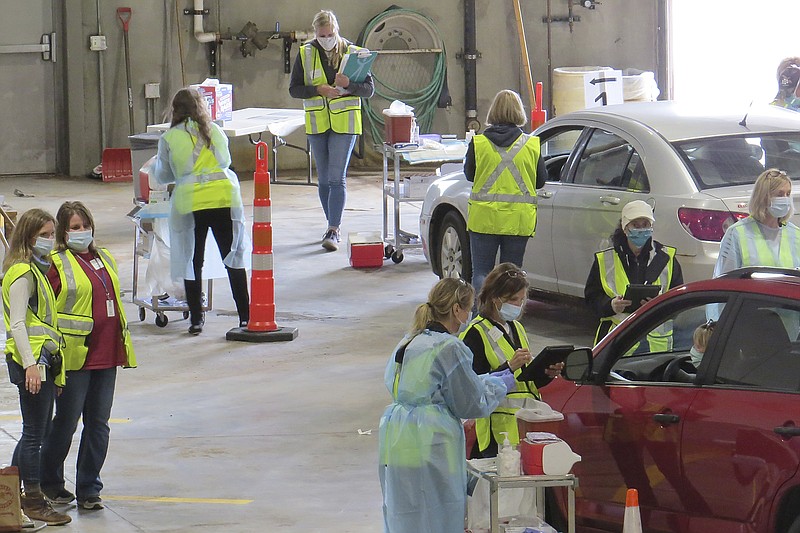With a covid-19 vaccine drawing closer, public health officials across the country are gearing up for the biggest vaccination effort in U.S. history -- a monumental undertaking that must distribute hundreds of millions of doses, prioritize who's first in line and ensure that people who get the initial shot return for the necessary second one.
The push could begin as early as next month, when federal officials say the first vaccine may be authorized for emergency use and immediately deployed to high-risk groups, such as health care workers.
"The cavalry is coming," Dr. Anthony Fauci said Thursday on ABC's "Good Morning America." He said he hopes shots will be available to all Americans in April, May and June.
Pfizer also boosted hopes this week, saying early data suggests its vaccine is 90% effective. But the good news came in one of the grimmest weeks of the pandemic so far. Deaths, hospitalizations and new infections are surging across the U.S. -- and turning up the pressure to get the vaccine effort right.
[CORONAVIRUS: Click here for our complete coverage » arkansasonline.com/coronavirus]
In Philadelphia, the health department is counting how many health care workers and others would be among the first in line. In Louisiana, officials are planning a remote exercise this week to play out different scenarios exploring how the process might unfold.
"If you get 10,000 doses, what are you going to do, versus 100,000 doses?" said Dr. Frank Welch, director of Louisiana's immunization program.
State and local officials also are planning for the likelihood that the first shipments will not be enough to cover everyone in high-priority groups.
Similar preparations are happening at the federal level. Welch listened in last week on a "war-gaming" session by the U.S. Department of Health and Human Services.
For the vaccination effort to get off the ground, state officials have been readying systems to track supplies and who has been vaccinated. That information will be fed into a national network and will be critical in giving federal health officials an up-to-date picture of vaccinations around the country.
[Video not showing up above? Click here to watch » https://www.youtube.com/watch?v=G_YCMqqa_7E]
Providers such as pharmacies and doctors' offices also will need to be able to look up records, so people do not have to return to the same place for their second shot. More than one vaccine also could become available, and doses cannot be mixed and matched.
"We not only have to bring people back for a second dose, but need to make sure that we have very good records of which vaccine they received the first time," said Dr. Jinlene Chan of Maryland's health department.
States already have immunization registries, which will be used for covid-19.
To better understand whether at-risk groups are getting vaccinated, the CDC wanted providers to report the race and ethnicity of the people they vaccinate. But pharmacies and other providers that do not always collect that information objected.
"We have to be careful not to put too many administrative burdens on providers that are already stressed," said Mitchel Rothholz of the American Pharmacists Association, an industry group.
He said providers have been told they will have the option to leave that information out.
Providers will have to report vaccination information daily, which will be an adjustment for those that typically enter data weekly or every couple of weeks, state officials said. To help people find doses in their areas, the CDC wants to put information on a vaccine finder website, which will be updated each day with the latest inventory.
Supplying that inventory information might be a staffing strain for some providers, including a hospital in Utah that said it only has one person who currently enters the information, said Jon Reid, who manages the state's immunization registry.
States are working to expand the number of pharmacies, doctors' offices and other providers that can administer covid-19 vaccines, to ensure shots are conveniently available.
But enrollment can be time-consuming, Reid said, because providers often need help filling out forms, getting technical systems working and going through inspections to ensure they can meet storage requirements. The Pfizer vaccine needs to be kept at minus 94 degrees Fahrenheit.
Given the hurdles, Reid does not expect smaller pharmacies to become covid-19 vaccine providers.
Because of the likely need for two doses given three or four weeks apart, the Centers for Disease Control and Prevention is considering ways of helping Americans remember the second shot, including issuing cards that people would get with their first shot, akin to the polio immunization cards many older Americans remember carrying.
Distributing doses is another issue. The Pfizer vaccine, which could be the first to get the green light, comes in shipments of nearly 1,000 doses.
"A minimum of 1,000 doses makes it very difficult to get smaller facilities vaccinated," said Rich Lakin, director of Utah's immunization program.
Shipments might go to a hospital that is easily accessible to health care workers from several sites, Lakin said.
"They may have to drive to that hospital to get the vaccine," he said.

